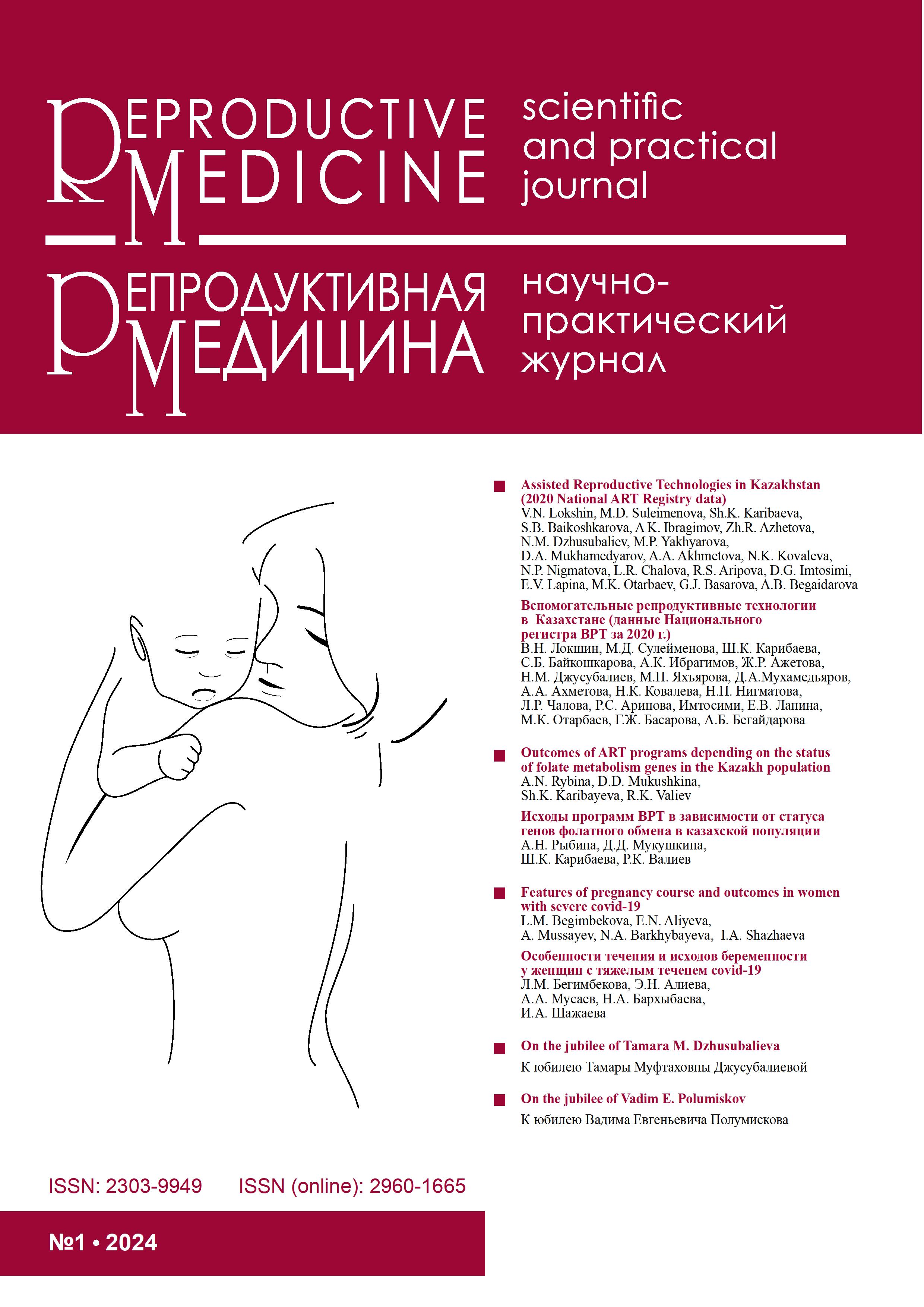The influence of the maternal microbiome on the development of preeclampsia: A literature review
DOI:
https://doi.org/10.37800/RM.1.2024.44-51Keywords:
preeclampsia, microbiome, pregnancyAbstract
Relevance: Preeclampsia is a leading cause of maternal and perinatal morbidity and mortality worldwide. Preeclampsia is a hypertensive disease of pregnancy. This severe variant of gestosis occurs after 20 weeks, is associated with angiogenic imbalance, maternal endothelial dysfunction, and end-organ damage, and is characterized by multiple organ dysfunctions. Regarding the fetus, its growth is limited. It is known that the microbiota is the main factor in maintaining homeostasis of the human body. It is entrusted with significant functions of energy metabolism, maturation and maintenance of the immune system, synthesis of vitamins, regulation of reabsorption of bile acids in the intestines, and much more.
The study aimed to determine the diagnostic significance of the intestinal microbiota in preeclampsia and its relationship with preeclampsia.
Materials and methods: PubMed and Web of Science databases were searched for studies published from 2012 to 2023 by the keywords «microbiome AND preeclampsia» and «microbiome AND pregnancy complications.» Thirty-seven foreign articles were analyzed.
Results: The studies’ results were similar, but ambiguous results were also found, which, of course, requires further study. It has been proven that opportunistic microflora contributes to developing numerous diseases under the influence of external factors.
However, the role of the microbiota has yet to be thoroughly studied due to various factors, ranging from the number of studies and their participants to ethical issues.
Conclusion: The question remains open whether the cause of preeclampsia is the «infectious burden» or the influence of some specific, currently unknown microorganism. The relevance of studying preeclampsia is undeniable, and it requires the search for new approaches to managing the occurrence and course of this disease and new opportunities for its prevention.
References
Chang Y, Chen Y, Zhou Q, Wang C, Chen L, Di W. Short-chain fatty acids accompanying changes in the gut microbiome contribute to the development of hypertension in patients with preeclampsia. Clin Sci. 2020;134:289-302.
https://doi.org/10.1042/CS20191253
Kramer MS. Isocaloric balanced protein supplementation in pregnancy. Cochrane Database Syst Rev. 2021;CD000118.
https://doi.org/10.1002/14651858.CD000118
Ota E, Tobe-Gai R, Mori R, Farrar D. Antenatal dietary advice and supplementation to increase energy and protein intake. Cochrane Database Syst Rev. 2015;CD000032.
https://doi.org/10.1002/14651858.CD000032.pub2
Khanna S, Tosh PK. A clinician’s primer on the role of the microbiome in human health and disease. Mayo Clin. Proc. 2014;89:107-114.
https://doi.org/10.1016/j.mayocp.2013.10.011
Petersen C, Round JL. Defining dysbiosis and its influence on host immunity and disease. Cell Microbiol. 2014;16:1024-1033.
https://doi.org/10.1111/cmi.12308
Heitkemper M, Jarrett M, Jun SE. Update on irritable bowel syndrome program of research. J Korean Acad Nurs. 2013;43:579-586.
https://doi.org/10.4040/jkan.2013.43.5.579
Li J, Zhao F, Wang Y, Chen J, Tao J, Tian G. Gut microbiota dysbiosis contributes to the development of hypertension. Microbiome. 2017;5:14.
https://doi.org/10.1186/s40168-016-0222-x
Isolauri E. Microbiota and obesity. Int Microbiome: Funct. Aspects Health Dis. 2017;88:95-106.
https://doi.org/10.1159/000455217
Hemberg E, Niazi A, Guo Y, Debnár VJ, Vincze B, Morrell JM, Kútvölgyi G. Microbial Profiling of Amniotic Fluid, Umbilical Blood and Placenta of the Foaling Mare. Animals (Basel). 2023;13(12):2029.
https://doi.org/10.3390/ani13122029
Beckers KF, Sones JL. Maternal microbiome and the hypertensive disorder of pregnancy, preeclampsia. Am J Physiol Heart Circ Physiol. 2020;318(1):H1-H10.
https://doi.org/10.1152/ajpheart.00469.2019
Giannella L, Grelloni C, Quintili D, Fiorelli A, Montironi R, Alia S, Delli Carpini G, Di Giuseppe J, Vignini A, Ciavattini A. Microbiome Changes in Pregnancy Disorders. Antioxidants (Basel). 2023;12(2):463.
https://doi.org/10.3390/antiox12020463
Domingo E. Introduction to Virus Origins and Their Role in Biological Evolution. Virus as Populations. 2016;1-33.
https://doi.org/10.1016/B978-0-12-800837-9.00001-0
Cavalier-Smith T, Chao EE. Multidomain ribosomal protein trees and the planctobacterial origin of neomura (eukaryotes, archaebacteria). Protoplasma. 2020;257(3):621-753.
https://doi.org/10.1007/s00709-019-01442-7
King Ch. The Tree of Life: Tangled Roots and Sexy Shoots. DNA Decipher Journal. 2011;1:73-109.
https://www.researchgate.net/publication/234027986_The_Tree_of_Life_Tangled_Roots_and_Sexy_Shoots
Shahab M, Shahab N. Coevolution of the Human Host and Gut Microbiome: Metagenomics of Microbiota. Cureus. 2022;14(6):e26310.
https://doi.org/10.7759/cureus.26310
Dominguez-Bello MG, Godoy-Vitorino F, Knight R, Blaser MJ. Role of the microbiome in human development. Gut. 2019;68(6):1108-1114.
https://doi.org/10.1136/gutjnl-2018-317503
Gorczyca K, Obuchowska A, Kimber-Trojnar Ż, Wierzchowska-Opoka M, Leszczyńska-Gorzelak B. Changes in the Gut Microbiome and Pathologies in Pregnancy. Int J Environ Res Public Health. 2022;19(16):9961.
https://doi.org/10.3390/ijerph19169961
Milani C, Duranti S., Bottacini F, Casey E, Turroni F, Mahony J, Belzer C, Delgado Palacio S, Arboleya Montes S, Mancabelli L, Lugli GA, Rodriguez JM, Bode L, De Vos W, Gueimonde M, Margolles A, Van Sinderen D, Ventura M. The First Microbial Colonizers of the Human Gut: Composition, Activities, and Health Implications of the Infant Gut Microbiota. Microbiol Mol Biol Rev. 2017;81(4):e00036-17.
https://doi.org/10.1128/MMBR.00036-17
Ames NJ, Ranucci A, Moriyama B, Wallen GR. The Human Microbiome and Understanding the 16S rRNA Gene in Translational Nursing Science. Nurs Res. 2017;66(2):184-197.
https://doi.org/10.1097/NNR.0000000000000212
Ursell LK, Metcalf JL, Parfrey LW, Knight R. Defining the human microbiome. Nutr Rev. 2012;70(1):S38-44.
https://doi.org/10.1111/j.1753-4887.2012.00493.x
Geldenhuys J, Rossouw TM, Lombaard HA, Ehlers MM, Kock MM. Disruption in the Regulation of Immune Responses in the Placental Subtype of Preeclampsia. Front Immunol. 2018;9:1659.
https://doi.org/10.3389/fimmu.2018.01659
Hou K, Wu ZX, Chen XY, Wang JQ, Zhang D, Xiao C, Zhu D, Koya JB, Wei L, Li J, Chen ZS. Microbiota in health and diseases. Signal Transduct Target Ther. 2022;7(1):135.
https://doi.org/10.1038/s41392-022-00974-4
Belkaid Y., Hand TW. Role of the microbiota in immunity and inflammation. Cell. 2014;157(1):121-141.
https://doi.org/10.1016/j.cell.2014.03.011
Ley RE, Peterson DA, Gordon JI. Ecological and evolutionary forces shaping microbial diversity in the human intestine. Cell. 2006;124:837-848.
https://doi.org/10.1016/j.cell.2006.02.017
González-Soltero R, Bailén M, De Lucas B, Ramírez-Goercke MI, Pareja-Galeano H, Larrosa M. Role of Oral and Gut Microbiota in Dietary Nitrate Metabolism and Its Impact on Sports Performance. Nutrients. 2020;12(12):3611.
https://doi.org/10.3390/nu12123611
Vanhatalo A, Blackwell JR, L'Heureux JE, Williams DW, Smith A, Van der Giezen M, Winyard PG, Kelly J, Jones AM. Nitrate-responsive oral microbiome modulates nitric oxide homeostasis and human blood pressure. Free Radic Biol Med. 2018;124:21-30.
https://doi.org/10.1016/j.freeradbiomed.2018.05.078
Ishimwe JA. Maternal microbiome in preeclampsia pathophysiology and implications on offspring health. Physiol Rep. 2021;9(10):e14875.
https://doi.org/10.14814/phy2.14875
Tang W, Zhu H, Feng Y, Guo R, Wan D. The Impact of Gut Microbiota Disorders on the Blood-Brain Barrier. Infect Drug Resist. 2020;13:3351-3363.
https://doi.org/10.2147/IDR.S254403
Jin J, Gao L, Zou X, Zhang Y, Zheng Z, Zhang X, Li J, Tian Zh, Wang X, Gu J, Zhang Ch, Wu T, Wang Zh, Zhang Q. Gut Dysbiosis Promotes Preeclampsia by Regulating Macrophages and Trophoblasts. Circulation Research. 2022;131:492-506.
https://doi.org/10.1161/CIRCRESAHA.122.320771
Wu Zh, Ge M, Liu J, Chen X, Cai Zh, Huang H. The gut microbiota composition and metabolites are different in women with hypertensive disorders of pregnancy and normotension: A pilot study. The journal of obstetrics and gynecology research. 2023. https://doi.org/10.1111/jog.15844
Liu ZZ, Sun JH, Wang WJ. Gut microbiota in gastrointestinal diseases during pregnancy. World J Clin Cases. 2022;10(10):2976-2989.
https://doi.org/10.12998/wjcc.v10.i10.2976
Li P, Wang H, Guo L, Gou X, Chen G, Lin D, Fan D, Guo X, Liu Z. Association between gut microbiota and preeclampsia-eclampsia: a two-sample Mendelian randomization study. BMC Med. 2022;20(1):443.
https://doi.org/10.1186/s12916-022-02657-x
Luo M, Cai J, Luo S, Hong X, Xu L, Lin H, Chen X, Fu W. Causal effects of gut microbiota on the risk of chronic kidney disease: a Mendelian randomization study. Front Cell Infect Microbiol. 2023;13:1142140.
https://doi.org/10.3389/fcimb.2023.1142140
Amarasekara R, Jayasekara RW, Senanayake H, Dissanayake VHW. The microbiome of the placenta in pre-eclampsia supports the role of bacteria in the multifactorial cause of pre-eclampsia. J Obstet Gynaecol Res. 2015;41:662-669.
https://doi.org/10.1111/jog.12619
Sterpu I, Fransson E, Hugerth LW, Du J, Pereira M, Cheng L, Radu SA, Calderón-Pérez L, Zha Y, Angelidou P, Pennhag A, Boulund F, Scheynius A, Engstrand L, Wiberg-Itzel E, Schuppe-Koistinen I. No evidence for a placental microbiome in human pregnancies at term. Am J Obstet Gynecol. 2021;224(3):296.e1-296.e23.
https://doi.org/10.1016/j.ajog.2020.08.103
Olaniyi KS, Moodley J, Mahabeer Y, Mackraj I. Placental Microbial Colonization and Its Association with Pre-eclampsia. Front Cell Infect Microbiol. 2020;10:413.
Downloads
Published
How to Cite
Issue
Section
License
Copyright (c) 2024 The rights to a manuscript accepted for publication are transferred to the Journal Publisher. When reprinting all or part of the material, the author must refer to the primary publication in this journal.

This work is licensed under a Creative Commons Attribution-NonCommercial-NoDerivatives 4.0 International License.
The articles published in this Journal are licensed under the CC BY-NC-ND 4.0 (Creative Commons Attribution – Non-Commercial – No Derivatives 4.0 International) license, which provides for their non-commercial use only. Under this license, users have the right to copy and distribute the material in copyright but are not permitted to modify or use it for commercial purposes. Full details on the licensing are available at https://creativecommons.org/licenses/by-nc-nd/4.0/.




